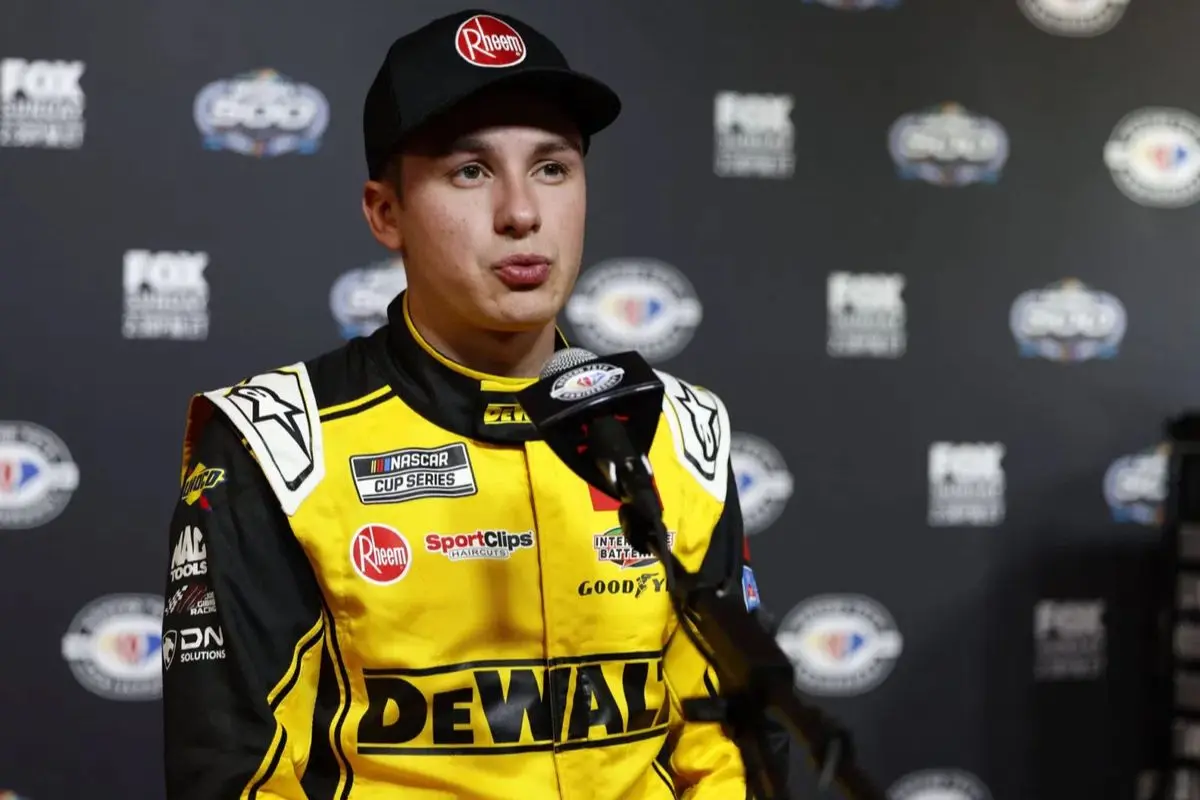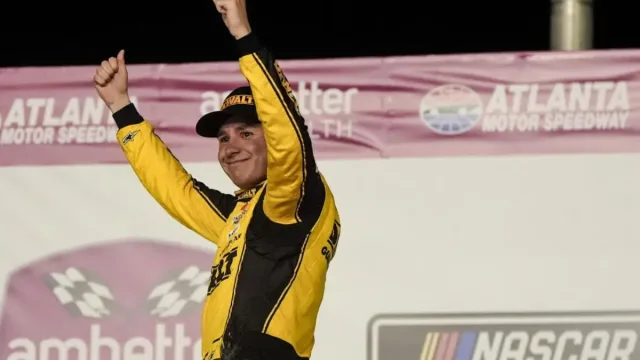Key Highlights
- Christopher Bell’s victory at the Ambetter Health 400 was secured by a controversial caution call, freezing the field late in the race.
- Critics raised concerns about inconsistencies in NASCAR’s late-race caution calls, comparing it to other recent races.
- Bell emphasized the importance of safety, supporting the caution call during the Atlanta race to protect drivers in dangerous situations.
- The caution decision has sparked discussions on officiating standards and its impact on race outcomes, frustrating some drivers.
- Celebrating his 10th career Cup Series win, Bell acknowledged the significance of this victory for his championship aspirations.
Christopher Bell Wins Ambetter Health 400 Amid Controversy
In a dramatic finish at the Ambetter Health 400, Christopher Bell emerged as the victor, but the race concluded amid considerable controversy.
Leading a fierce three-wide contest with competitors Carson Hocevar and Kyle Larson, Bell’s success was unexpectedly secured when NASCAR threw a caution flag, effectively freezing the field.
This decision has ignited heated discussions regarding the consistency of caution calls in recent races. Critics argue that comparable scenarios in earlier events were handled differently, prompting questions about NASCAR’s officiating standards.
While Bell celebrated the win, the contentious nature of the finish overshadowed his achievement, as commentators and fans similarly scrutinized the implications of the caution, highlighting the ongoing debate within the sport about fairness and regulatory consistency.

Christopher Bell Questions NASCAR’s Inconsistency in Late-Race Cautions
Why does NASCAR’s approach to late-race cautions appear inconsistent to many drivers and fans? Christopher Bell articulated this concern after his victory, highlighting key discrepancies in race officiating.
He pointed to events during the Daytona 500 and the NASCAR Xfinity Series race at Atlanta, where notable crashes occurred late but did not trigger cautions, allowing races to conclude under green.
Bell also reflected on his experience at Talladega, where he faced criticism for capitalizing on a wreck without a caution being called. This unpredictability raises questions about NASCAR’s decision-making process.
“We’ve been down this road before and I myself got crucified at Talladega a couple years ago because they wrecked and I was able to avoid the wreck and I advanced positions and they’re like, ‘OK, well for now on, whenever the cars wreck on the last lap, the yellow is coming out so that we don’t endanger people, and I think it’s the right call.” – Christopher Bell
Late Race Cautions – Christopher Bell Speaks Out #NASCAR pic.twitter.com/0HaswMffgD
— PRN (@PRNlive) February 25, 2025
The Daytona Duel Controversy and NASCAR’s Dilemma
The recent Daytona Duel controversy has highlighted the ongoing challenges NASCAR faces in maintaining consistent officiating during critical race moments.
Initially, Erik Jones celebrated a victory, only to have it rescinded when NASCAR determined a caution was waved before he crossed the finish line. This decision, which awarded the win to Austin Cindric, sparked considerable frustration among fans and participants similarly.
Christopher Bell identified this incident as representative of broader issues within NASCAR’s officiating framework, particularly in the context of the series’ desire to conclude races under green flags.
The duality of aiming for entertainment while ensuring fairness exposes a dilemma for NASCAR, raising questions about the integrity of race results and the management of race-ending scenarios.

Safety Over Spectacle: Christopher Bell Backs NASCAR’s Call
Safety remains a paramount concern in the world of NASCAR, as highlighted by Christopher Bell’s support for the recent caution call during the Atlanta race. Acknowledging the subsequent controversy, Bell emphasized that prioritizing driver safety is critical, arguing that protecting the back half of the field during a crash is fundamental.
“You don’t want to endanger the drivers and throwing the yellow flag to not make the back half of the field race for position that means so much on the white flag lap, I think it’s the right call.”
Although fans often seek exhilarating finishes, Bell insists that safety must take precedence.
Key points include:
- The need for immediate caution during dangerous situations.
- The responsibility of NASCAR to guarantee the well-being of all drivers.
- The balance between exciting racing and maintaining safety standards.
Christopher Bell Celebrates First Win of 2025, Thanks Sponsor DeWalt
Celebrating his opening victory of the 2025 season, Christopher Bell displayed his skill and resolve on the track during the recent race at Atlanta. This success not only marked Bell’s 10th career NASCAR Cup Series win but also his initial victory on a drafting track, highlighting his versatility as a driver.
Following the race, he expressed gratitude to his primary sponsor, DeWalt Power Tools, through an enthusiastic Instagram post, utilizing the hashtag #dewalttough to emphasize their partnership.
As Bell enters his fifth full-time season with Joe Gibbs Racing, he continues to solidify his status as a championship contender, having previously achieved two Championship 4 appearances. This win further cements his potential for future successes in the competitive NASCAR landscape.

News In Brief: Christopher Bell Shrugs Off NASCAR Controversy
Christopher Bell’s victory at the Ambetter Health 400 highlighted ongoing tensions within NASCAR regarding late-race caution calls. His questioning of the inconsistency in these decisions reflects a broader concern among drivers and teams about safety versus entertainment.
While Bell supports NASCAR’s focus on safety, the debate over race finishes continues, especially following previous controversies like the Daytona Duel. As NASCAR moves forward, finding a balance between spectacle and fairness will remain a critical challenge.
ALSO READ: Christopher Bell Leads Joe Gibbs Racing’s Revival as Team’s Massive Changes Pay Off Big
